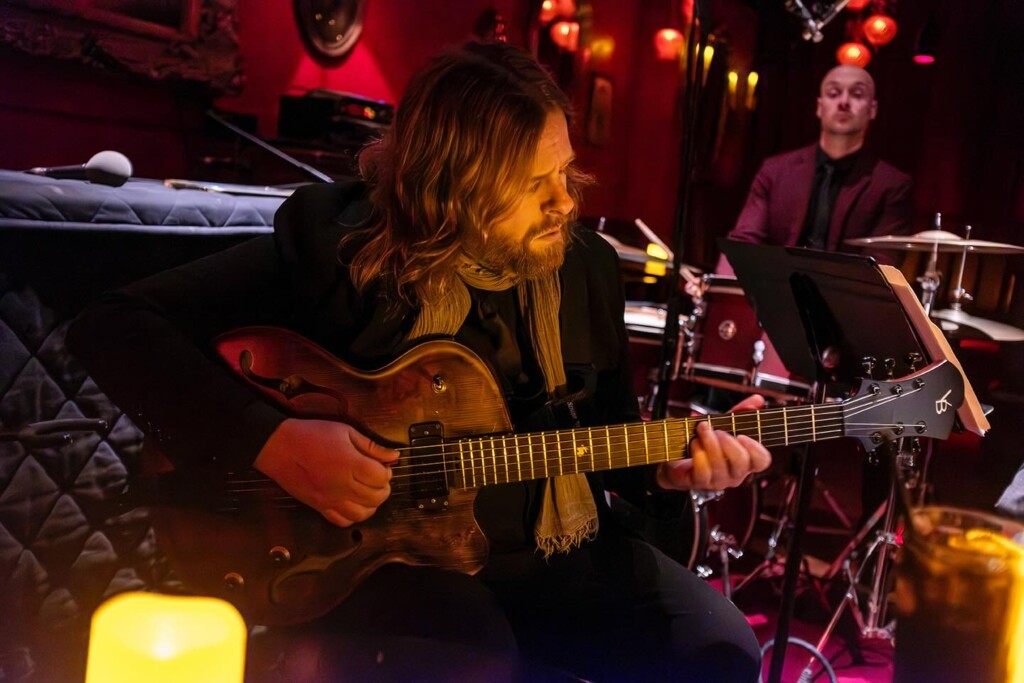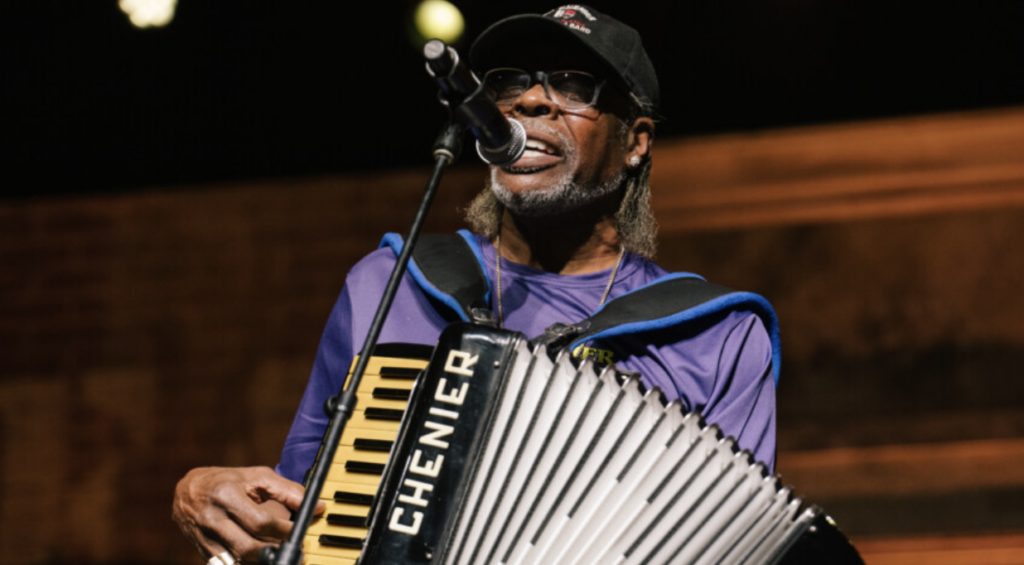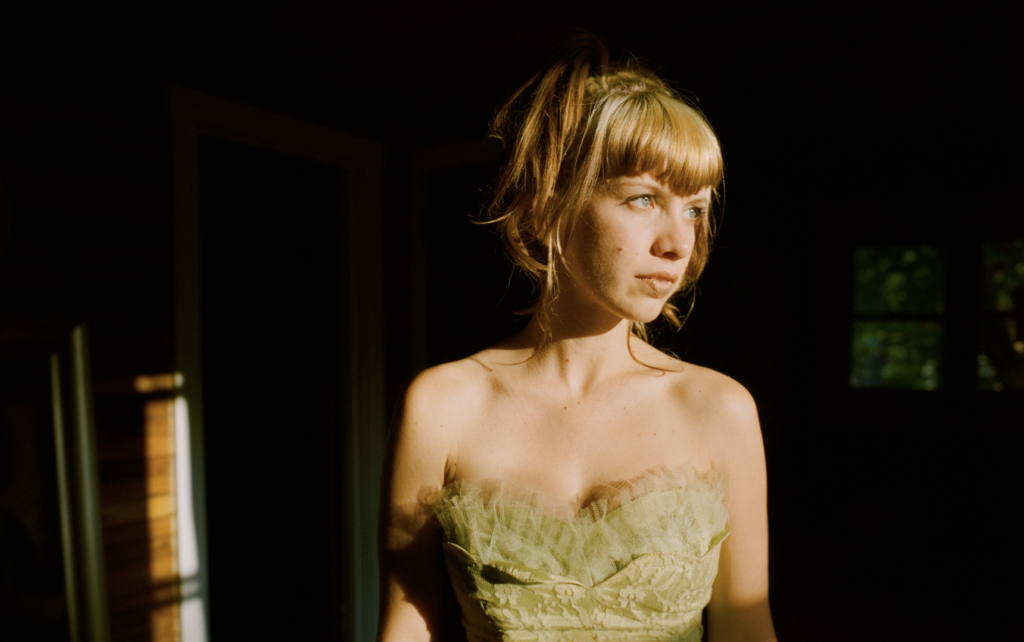Jazz guitarist Matt Hopper’s rebuild finds inspiration within and without
The KC original teases a new album—and a new reality—wrought by struggle and invention.
It is Tuesday night at Green Lady Lounge in downtown Kansas City. Outside, the chill of the night sees one, maybe two on the street, most drawing into themselves to stave off the cold.
Inside, The Matt Hopper Trio is showing. Unaccompanied, bassist Seth Lee and drummer Pat Adams build on the current rhythmic foundation laid. Then, jazz guitarist Matt Hopper speaks up. Leading the arrangement in new directions with emotive phrases and runs, Hopper sways, head down, bent over his confidante, his ever-trusty Victor Baker guitar. The aura fills the room, feeling the power, the intent, the mood stirring deep inside.
Inside, something deeply personal between Hopper and his guitar unifies.
“Without music, I’d be a dumbass,” Hopper states as he sits in one of the lounge’s broad booths after the show.
“If you are not growing, it’s really unpleasant and soul-sucking. [Education] makes me who I am,” expressed an effusive Hopper, whose jaunts include teaching at various schools. “Without music, I would not have discovered that if I want to be a great musician, I have to learn how to learn. And then how to teach it. Then, teaching makes you a better learner.”
The 19-year UPS employee turned full-time musician–and now part-time teacher–produced his first album, First Love, in 2015, then Live at Green Lady Lounge in 2021. This night serves as a warmup for his next full-length album, coming Summer 2025.
As Hopper leads his trio through his compositions, he commands with subtlety inside an affable, giving nature. But command he does, as his conspirators recognize the artistry they convey. The lithe, crisp movements jumping from Hopper’s fingers conjure alluring rhythms and bright melodies that emit a classic, yet enterprising sound.
That sound is shaped by a life of earned triumphs and unexpected trials. But also by a sound that means rhythm, family, and musical harmony to Hopper: the sound of Brazil.
What is now a radiating influence began with a journey south pre-COVID. “Hearing how they would harmonize, make chord structures in their harmonies. That’s different than what we do here for jazz, so I started learning,” Hopper explained. Thus, a horde of books and CDs and a second backpack to carry them all became Hopper’s companions of thought beyond a willing ear.
“We hear rhythm as 1-2-3-4, 1-2. They hear everything as 1-2, 1-2, tat, tat, tat, tat, tat. And the dancing… everything is danceable. I said, ‘This makes sense to me, like classical music with this different rhythm.’”
Though Hopper advertises as a jazz guitarist, his inventions tease the ear with blues and an interest shared by drummer Adams.
“I run into Matt at a lot of progressive rock shows in town: Animals as Leaders or Queenie,” revealed Adams. “There are various progressive guitar players he is into, and I really like that drumming style. A lot of that [sound] comes out, even in this jazz scenario.”
When Hopper grooves into a rollicking lick, he doesn’t let go, adding variations while hanging onto the momentum. The certainly adept, sometimes scintillating, always invigorating trio lets it ride, maybe even unhinge, because discovery lies there too.
Hopper’s dedication to his craft was hatched in discovering a mutual bond with his triathlete father, a father previously aloof. “At the age of 12, I found my dad’s acoustic guitar,” Hopper recalled. “I wanted to play, and he showed me a couple things. So [I] got more attention; I wanted that.”
The feeling of disconnect now connected was the genesis of Hopper’s life philosophy that came out when asked where he is at this moment in life.
“In life, I don’t know. I have surrendered to this thing: Wherever life takes me and needs me, I will go. I was playing in wedding bands and doing all this other stuff two years ago, never thought I’d go into teaching. It just came up,” related Hopper. “Then I had a marriage that didn’t work. I had to figure out who I was. I felt I had lost everything. I had to rebuild, and I had to get help. I just wanted to be able to do what [the therapists] told me to do, and I used my [guitar] practices to help me achieve that.”
Then, his father’s cancer battle brought Hopper more of the feel of the tight knit, “mean more to them than just I love you” families of Brazil. Now, his father is back playing the guitar – “all the time” – and Hopper changes out his strings.
Through the times of ‘I’m worthless. I’m never going to be good for anything,’ Hopper discovered a more compassionate and caring self, and this impacted who he is as a musician.
“I have a totally different, more positive perspective than what I had before, where it was a musician’s work and we take, take, take, and it’s hard to give back,” said Hopper. “Well, why don’t we give back more? It’s funny how that works: you get more out of it and your life gets easier and you get more.
“I know what it feels like [to struggle], so I want to be able to help people when they feel like that. I want to keep them feeling good, so I need some counselors to help inspire those who are having a rough time. And, hopefully, inspire those who are creative to get more creative.”
Hopper visualizes a community of creatives forging their own realities, their own path, through common passions.
Adams believes Hopper’s work is taking root even in just their trio. “His passion for the instrument and the music,” he responded when asked what makes Hopper unique. “When players like us get together, it re-ignites it. We have similar philosophies in seeking inspiration in different places.”
There are moments of delightful interplay as Lee’s bass walks down a scale and Hopper’s emotive fingering picks out evocative melodies that float over the bass into the crowd and into their passions. It is talent that not just lights your senses, but brings new sensations… because it is formed and performed with a soul’s desire.
“We are excited because we are getting regular reps, which is what I love,” confessed Adams. “We are actually building these tunes every week – changing things, trying things out.”
Hopper then ignites the lounge, plucking out faster notes that flow in variation and incite urges to flow along, to bounce and jive and bop along. He raises his head, and a broad smile arcs across his features.
What makes your compositions unique?
“Because we are unique. It’s individuals,” says Hopper. “[My compositions] are what comes naturally in my ear. I have my own ways of using harmony. Maybe others have, and I just don’t know because I haven’t heard it.
“I’m not trying to say I am a creator of a new sound or a new genre. But I am definitely trying to make it mine, so that when people listen to it, they say, ‘That’s one of Matt’s songs.’ That would be really cool.”
The cold, the isolation, the chaos without and within disappear inside Green Lady Lounge. A vital human struggling like each of us, yet persevering in the joy of his art informing his soul is unleashed. And it re-ignites all.
Yes, there is value in this life when lived, when loves are granted freedom to give and grow.







